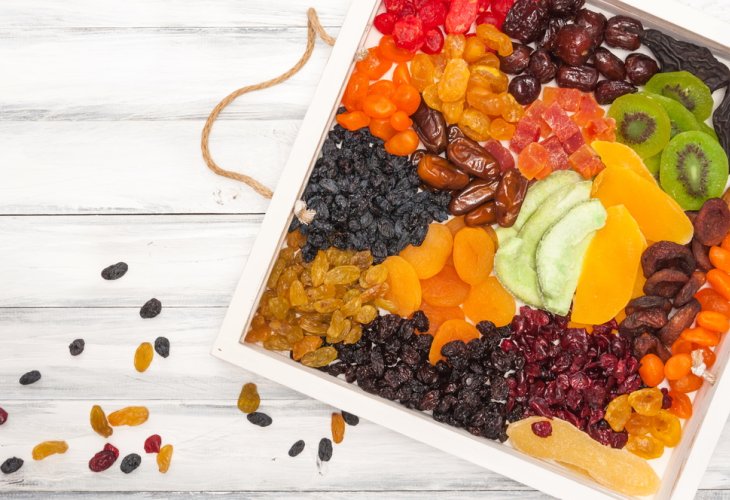Tu Bishvat Is Here – What’s in Dried Fruits?
Are dried fruits as healthy as we think? What should we check before buying dried fruits? And which traditional Tu Bishvat food is recommended?
 (Photo: shutterstock)
(Photo: shutterstock)Who among us doesn’t reminisce about holidays through the supermarket shelves – even now, in honor of Tu Bishvat approaching, we see extravagant and colorful plates of dried fruits of all kinds: pineapple, apricots, figs, raisins, dates, plums, and basically what not. It is widely known that dried fruits contain a lot of sugar, hence there is a need to avoid them, but is it recommended to consume them in terms of nutritional values?
What’s in Dried Fruits?
Dried fruits enjoy a healthful image that is not entirely justified. On the positive side, being fruits – they contain essential vitamins and minerals for us, such as calcium, iron, and potassium, as well as dietary fibers that assist digestion. However, it is important to know that industrial drying processes, which involve heat treatment and the addition of chemicals, actually alter the nutritional values of the fruits, and these benefits are not always retained.
In terms of sugar amounts, starting with the bottom line – dried fruits have a lot of sugar. A lot. In fact, it's about 3-4 times more than fresh fruits, which themselves contain quite a bit of sugar. An average-sized fresh fruit contains about 3 teaspoons of sugar, while a large fruit can contain 5-6 teaspoons of sugar. Consider what this means for dried fruits. It’s also important to note that sour fruits do not necessarily contain less sugar; rather, their sourness is caused by the presence of organic acids that mask the sugar's taste. These facts are especially important for diabetics, who need to maintain balanced sugar levels. Therefore, diabetics are recommended to understand the impact of dried fruits on their blood sugar levels through sugar tests around fruit consumption, even if the quantity consumed is small.
If dried fruits are consumed after all, it's advisable to choose more wisely by examining the ingredient list. The first thing diabetics should ensure is that there is no added sugar. Some fruits have sugar added in addition to the naturally occurring sugar in the fruits. Furthermore, if the list includes preservatives like sulfite or sulfur dioxide, it might be wise to avoid them, as some people are sensitive to these substances and they can cause unpleasant reactions like shortness of breath and nausea. It's recommended to prefer dried fruits that are organic and do not contain such substances. Additionally, you might be surprised to discover that some dried fruits have oil and artificial food colors. For example, dried papaya often has the food dye tartrazine added, which is not recommended. Prefer dried fruits with only natural food colors. Be aware that if you buy dried fruits by weight and without packaging with labeling, you're essentially buying a "pig in a poke" and cannot know what has been added to them.
What Should Be Eaten During the Holiday??
If you are diabetic or simply keen on maintaining moderate sugar consumption, it's recommended to avoid or reduce dried fruits and instead consume another traditional Tu Bishvat dish – nuts. They are rich in a variety of nutrients and are a healthy source of protein and fats. For diabetics, nuts combined with other foods contribute to a moderate increase in sugar levels a few hours post-meal. For instance, if you eat a fruit combined with nuts or almonds, the fat in them will cause a slower digestion process, so eventually, the blood sugar level will increase more moderately.
It is advised to prefer nuts in their natural state, not roasted or from convenience stores. The fat in roasted nuts oxidizes and alters its chemical composition, losing its benefits, and the nuts from convenience stores are very high in salt. The main disadvantage of nuts, and in fact, almost the only disadvantage they have, is their high caloric value. In every 100 grams of nuts, there are between 550-700 calories. Therefore, it's important to consume them in moderation (or according to a personal recommendation by a dietitian). Moreover, nuts are very rich in nutrients, and a few nuts a day provide the necessary nutritional values.
In conclusion, it is undoubtedly recommended for diabetics and those who care about maintaining sugar levels to prefer nuts over dried fruits, as the former have more nutritional values and less sugar. Furthermore, you can prepare festive foods and even desserts with nuts, allowing you to enjoy a healthy and tasty holiday. Happy holiday!
Einat Mazor Bakar is a clinical dietitian at the obesity clinic at the DMC center

